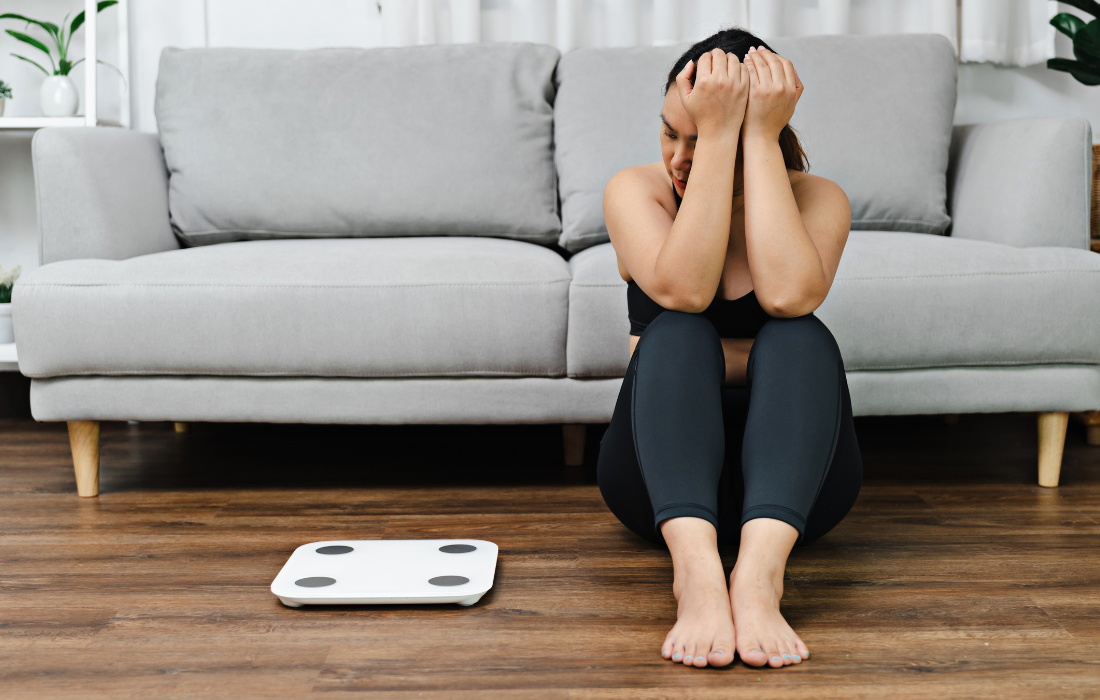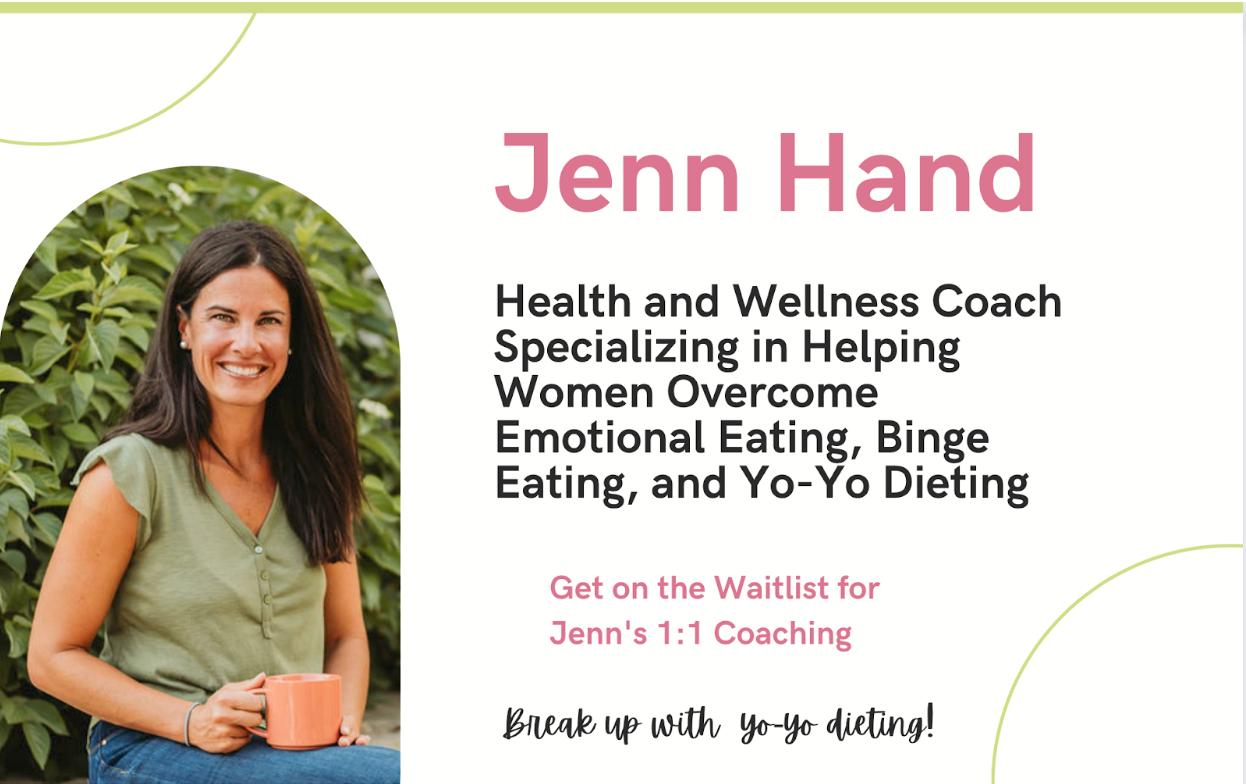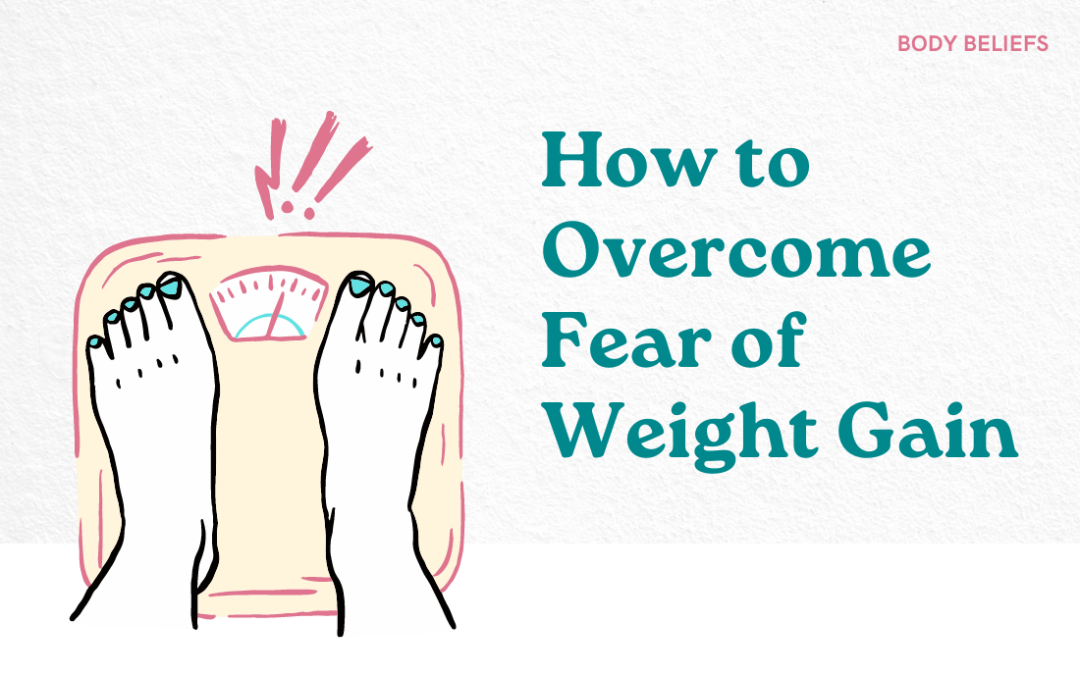Written by Jenn Hand, Holistic Nutritionist, Board Certified Health Coach, NBC-HWC
“What if I gain weight?“
Whether you’re new to learning how to eat normally or have been on this path for years, inevitably the fear will arise: what if I gain weight?
Typically, when we’re focused on dieting it can seem to give us a sense of control around food.
We feel “safe” knowing we are following something.
So when we go off the plan and are working to find our normal, it can feel very scary!
It can seem like we’re jumping off the proverbial cliff into the unknown.
In this post and podcast I’m going to cover how to overcome fear of gaining weight so that fear doesn’t take over your life. There are three main things you can do, so let’s get into it!
So what to do when the fear of weight gain comes up on this path?
Prefer to listen to the podcast instead of read? Do so here:
How to Overcome Fear of Gaining Weight: 3 Steps to Explore
1. Remember the 12-Step Program Slogan: One Day at a Time
When I went to my first Overeaters Anonymous meeting years ago, someone who saw me struggling leaned over and said to me:
“Your job is to stay in today.”
That’s it.
Don’t think about tomorrow, 6 months from now, or your best friend’s daughter’s wedding next summer that you think you need to lose weight for.
Just for today, focus on nourishment, on trust, on fuelling your body.
One of the things that really tripped me up was thinking I needed to “fix” this whole binge/restrict cycle FOREVER.
Of course, thinking about fixing anything forever is overwhelming.
It shut any progress down immediately and would send me into a binge.
So how can you focus on today?
- What food would feel like a balanced meal today?
- What’s one thing you can do to help you trust your body today?
And when the anxious thought comes back in around needing to fix the issue forever, remind yourself of the 12 step slogan:
One day at a time.

2. Ask Yourself: What Are You Associating with Weight Gain?
Here’s the thing. There is always something beneath our biggest fears.
If you would gain weight…
What does that mean to you?
- Maybe you’re afraid of people commenting on your body
- Or you have a fear that you won’t be enough (or desirable, confident, etc)
- Maybe you’re afraid for health reasons (aka your doctor told you you needed to lose weight to prevent diabetes)
- Or you have a fear of spiralling out of control around food
Explore your fears. Ask. Listen to what comes up. And then address THAT.
Because if we gain 25 pounds, it’s just a number until we put a meaning on it.
Think about it: a rainy day is just a rainy day.
Unless you’re on the beach in Jamaica and it’s ruining your vacation. Then it’s terrible, awful and has put a damper on what’s supposed to be an amazing week. It’s neutral until we put a meaning on it.
Same with weight. It’s a neutral number until we assign a meaning.
And trust me, even though I don’t weigh myself anymore, I have put a meaning on every weight in my binge/restrict history. It’s still a challenge for me, as I can look back on any photo and have a meaning etched into my mind of my size and where I was in the binge/restrict cycle.
Explore your fears, begin to bring those to light, and it’ll lose some of its power.

3. Explore What Would Help You Have Faith in this Process
This process of letting go of dieting and learning how to listen to your body, to build a new relationship to food, and to find your “normal” is just that. A process. It’s challenging in this world of “quick fix” diets and instant gratification.
Every food plan can taut a temping promise:
“Do XYZ for 30 days and you’ll lose X pounds!”
But these programs don’t give us what we truly, deeply want.
Freedom.
Freedom to trust ourselves around food.
A peaceful and joyful relationship in what we choose to eat.
Tuning in to hear the wisdom of our bodies (yes, it’s in there!)
This path gives us an incredible gift…
One where you don’t HAVE to buy another food plan again because you’ve learned how to listen to your body.

So what would help you have faith in this process?
A support group? A book? Starting a journal? Meditation? Prayer? One-on-one coaching and support? Research to remind you why diets don’t work? Writing about what you really desire and your “why” when things get tough? Explore the whys to help you have faith in the process.
This path is not the easy path. But it IS the path that ends up giving us what it is we really want: freedom.
Which of the three resonates with you to help you on this path? (Or maybe you came up with one on your own!) Feel free to share below 🙂
More Articles About Holistic Weight Loss and Intuitive Eating
⚪ How to Get Off the Diet Roller Coaster
⚪ 7 Myths of Weight Loss
⚪ If You’re Not Dieting, How Will You Lose Weight?
Get the Normal Eater’s Newsletter
Join 8000+ women who are overcoming overeating, binge eating, and breaking up with dieting forever. Get Jenn’s inspiring and actionable weekly newsletter with the latest posts, podcasts, and tips on how to love your body, find food freedom, and lose weight holistically.
Get the Normal Eater’s Newsletter
Work with an Emotional Eating & Holistic Nutrition Coach
Overcome Bingeing and Emotional Eating, and Break Up with Yo-yo Dieting
Working with an emotional eating coach and holistic nutritionist can help you get free from the frustrating binge and restrict cycle and stop yo-yo dieting.
You don’t have to be obsessed with food or have a million rules around eating to find your natural weight and learn to love your body. Ready to actually see a lasting change and experience true freedom?
Schedule a 20-min CallAbout the Author:

Jenn Hand has been helping women like you become normal eaters since 2015.
She’s worked with thousands of women, helping them to balance their bodies, end bingeing, stop obsessing over food, and start feeling amazing again. As a board-certified health coach and holistic nutritionist, Jenn knows how to support you in making real positive changes that last.
Her articles have been published on Mind Body Green, Tiny Buddha, Thrive Global and other local and global media platforms. She’s the author of How to Be a Normal Eater and the creator of The Normal Eater’s Club program. Listen to Jenn’s advice and tips on the Cake Doesn’t Count Podcast, or read more of her articles for free on the Food Freedom Blog.
Learn About Coaching!




